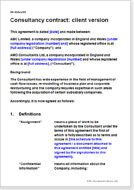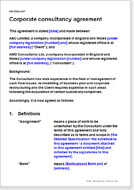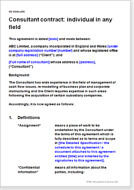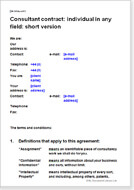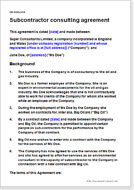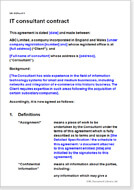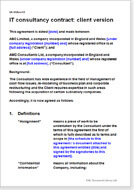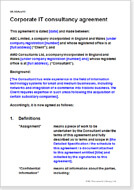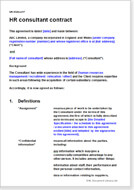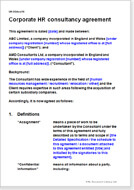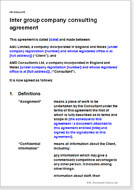Consultancy agreements
Consultancy is provided by a vast range of businesses, from large international companies to sole traders, with the type of work undertaken varying greatly, even in the same sectors.
Our agreements include comprehensive contracts between companies and simpler ones for individual professionals. All our documents are written in modern language and can be tailored easily to favour the interests of the consultant or their client.
Consultancy contract: client version
This consultancy contract is for use by any business looking to take on a consultant, i.e. where you are the client wanting to present your own contract to the consultant to obtain terms important to you.
It is drawn for you to contract with a corporate consultancy, but you can easily edit it to take on a single person.
It provides terms acceptable to the consultant but strongly protects the client's interests.
Examples of when you might use include:
- to avoid the straight jacket of an "industry standard" contract provided by a professional body
- to establish the independent status of any person who might otherwise be regarded as your employee
- to be able to present your terms clearly and neatly when you first approach any third party with a view to instructing him or her
Corporate consultancy agreement
This consulting services agreement is for an organisation providing advice to large or to small clients on any matter. The employees of the consultancy carry out the work.
Examples include:
- an accounting firm providing tax advice
- an environmental advisory business conducting a review of water systems
- an independent financial advisor works through a company structure
In addition to standard terms, this agreement includes optional provisions:
- for accountants or others working for a client who is a bank, and assessing a distressed bank customer
- to cover your relationship with a bank if you have been appointed by an administrator or liquidator
Consultant contract: individual in any field
This agreement is for an expert independent contractor in a particular field to provide expert advice to a large or small client.
The consultancy may be a full time occupation, or it may be additional work, for example you may be:
- semi-retired providing advice to a former employer
- an expert witness
- a hobbyist called on for a specialist task
- a university employee who also accepts part-time commercial work
This document assists in establishing your status as a self employed person for IR35 purposes.
It is drawn in terms to be acceptable to a client but strongly protects the consultant.
Consultant contract: individual in any field: short version
This is a short version of our contract for an individual consultant (a freelancer), stripped out some of the detailed provisions which you may not need in less formal circumstances.
Use this document when you think a longer version may not be acceptable to the client. Reductions are small, but this contract can be printed on one sheet of A4.
The agreement is for a single, fully described work assignment - likely to be a standardised service that you offer to all clients, such as providing a set number of hours of investment advice.
It should be used by an independent contractor working in any industry including: HR, IT, health and safety, environment, finance, general business and engineering.
Subcontractor consulting agreement
This document is for a consultancy business that wishes to sub-contract work.
It assumes that you are sub-contracting to a self-employed individual, but you can easily edit it so that it is suitable to take on another company.
Use for a one-off assignment or for a consultant you wish to use repeatedly or continuously.
This document will help you to:
- avoid challenges by HMR&C that your sub-contractor is an employee
- prevent your sub-contractor from poaching your clients or staff
- protect your own and your clients' confidential information
- avoid conflicts of interest with your sub-contractor
IT consultant contract
This document is similar to our standard consultancy contract for an individual, but has been tailored to suit a professional involved in the technology industry. For example, you may be:
- contributing to the development of new hardware
- adding functionality to an existing system
- diagnosing faults and inefficiencies in a client's network
- maintaining a small office IT system
It is suitable for working with large or small clients, on a single or multiple assignments. The terms are drawn to be acceptable to the client, yet strongly protect the consultant.
This document will assist in establishing your status as an independent contractor for tax purposes.
IT consultancy contract: client version
This consulting services agreement is for an organisation wishing to hire a consultant for an IT or tehnology based project. The terms are fair and acceptable to the consultant, yet favour the client's interests.
The document is drawn such that the consultant is a company that provides the services of one or more individuals to the client, but it could easily be amended to contract with a self-employed individual.
Use this agreement to make sure that the terms of your deal are as favourable to you as possible.
Corporate IT consultancy agreement
This is our standard corporate agreement, that incorporates additional terms for a situation where the work involves a substantial intellectual property, scientific or high technology content.
The document might be used by a firm that:
- installs and configures a specialist software system (such as for managing inventory)
- carries out software based services, such as data analysis or auditing
- provides consultancy on which type of IT system to install
HR consultant contract
This document is based on our standard consultancy contract, but has been modified for a self-employed human resources consultant. For example, you may be:
- managing outsourced HR functions of small businesses
- undertaking search and recruitment of senior employees
- providing specialist advice on a delicate matter such as dismissal
- conducting a review of strategy
The document can be used with large or small clients, on a single project or on multiple assignments. The terms should be acceptable to the client, yet give the consultant strong legal protection.
This document makes clear your status as an self-employed consultant for tax purposes.
Corporate HR consultancy agreement
This document is our standard corporate consultancy agreement modified to be more suitable to businesses that provide human resources consulting.
The document might be used by a firm that provides services such as:
- outsourced HR management services such as job evaluations and salary processing
- advice on particular areas of specialism such as redundancy
- advice on wider human capital issues such as organisational culture and talent management
This document provides a legal framework, not a specification for work carried out. It is therefore suitable for a wide range of services relating to human resources.
Inter group company consulting agreement
This consultancy agreement is for use by a two companies within a group, one providing services to the other.
The reason for use may be:
- to allocate profit lawfully where most advantageous to do so
- to separate out the affairs of one particular subsidiary so as to prepare it for sale or closure
- to tidy up a muddled accounting situation between subsidiaries
- to clarify inter-company rights before a sales of shares or introduction of a new lender
The nature of the work is not important within the document.
The document is drawn for fairness between two equal parties. If you wish to prefer the interest of one party, you should use our standard agreements.
The document contains broadly the same provisions you would expect to find in any commercial consultancy contract. There are no implied “friendly terms” on account of the parties being associated.

If the document isn’t right for your circumstances for any reason, just tell us and we’ll refund you in full immediately.

We avoid legal terminology unless necessary. Plain English makes our documents easy to understand, easy to edit and more likely to be accepted.

You don’t need legal knowledge to use our documents. We explain what to edit and how in the guidance notes included at the end of the document.

Email us with questions about editing your document. Use our Lawyer Assist service if you’d like our legal team to check your document will do as you intend.

Our documents comply with the latest relevant law. Our lawyers regularly review how new law affects each document in our library.
About these consultancy agreements
These are comprehensive legal documents that cover the commercial and practical points that will be important to both the consultant and his or her client.
Although written in plain English, the concepts are deep and the documents are thorough. Using one of these templates will enhance your brand as a professional and well organised business, as well as protecting your intellectual property and helping each piece of work undertaken to progress smoothly.
Our contracts are tailored for three types of user:
- for corporate consultancy (the consultancy company could employ multiple employees, or simply be a structure through which an individual works)
- for a single self-employed consultant working alone or with colleagues or sub-contractors
- for the client company or business
The documents for the consultants emphasise the legal structure through which the work will take place. For example, the versions for self-employed consultants emphasise the independence of the contractor for tax purposes.
The versions for the client favour their own interests more strongly than alternative versions.
We also offer variants for contractors in the IT and HR industries.
The majority of each agreement for a certain type of user is the same regardless of the industry because the main subject of the contract is how the work is performed, not what the work involves.
Where the contracts for specific industries differ is largely in the even heavier coverage of intellectual property and confidentiality, which are more likely to be important in those industries.
What is in these agreements
It will not help you to list every detail, but here are some of the important provisions covered by each document. Bear in mind that no agreement contains unnecessary provisions.
- Contract summary and payment options
- Work management procedure
- Consultant's obligations
- Option for the use of sub-contractors
- Confidentiality
- Ownership of intellectual property created by the consultant
- Data protection
- Option for no competition
- Limitation of your liability
- Duration and termination
You will probably be fully aware of why each provision is necessary, but just in case you need help, each document comes with very extensive explanations and advice contained in the drafting notes as well as a separate guide to editing legal document templates.
Additionally, to help you to avoid having to consider exact words, each template provides options - you just select which option you want to preserve and delete the others. This applies in particular to payment systems and working arrangements.
Protection of intellectual property
In the course of any business relationship much of confidential information is shared. Both the client company and the consultant have interests in making sure that any third party obtains it.
That confidential information may be strategic, such as future plans for expansion, or it may be intellectual property created during the assignment.
The structure and the contents of these contracts reflect the latest thinking on what is needed to balance the protection of the client business from theft of its intellectual property while ensuring that IP belonging to the consultant can be used elsewhere.
Legal requirements for personal data protection under The Data Protection Act (incorporating the GDPR) are, of course, included.
Other matters
An umbrella agreement
In our contracts, we keep the description of the services provided separate to the legal clauses.
In structuring the agreement in such a way, distinguishing the deliverables is much easier and the agreement becomes an 'umbrella contract' ready set up for the possibility of future assignments under the same terms.
All later assignments of work become automatically subject to the terms of your original contract unless you agree to a new one.
All that is needed for any subsequent assignment is a description of the work to be carried out and a reference to the agreement.
Treat as your standard contract or negotiate terms
Of course, you can either edit an agreement and use it as your standard terms, or you can negotiate the detail of each individual project.
The importance of a good specification of work
We cannot over-emphasise the importance of a thorough and agreed specification of work. The agreement you will choose will reduce the chance of conflict on the operation of the agreement and the application of the law, but only you can describe the work in detail.
The contracts provide for the specification of work to be placed in a schedule to the agreement the first time it is used.
The law relating to this agreement
The governing law in all these consultancy agreements is Welsh and English law.
There is little statute law relating to the provision of consultancy services so the framework for the contracts depends on basic contract law and tort.
All rights reserved

